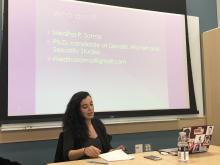by Bret Windhauser
Mediha Sorma from the Gender, Women, and Sexuality Studies Department presented her research on “Subaltern Mothering and the Political Elsewhere: Militant Mothers of Kurdish Resistance towards a Stateless Freedom.” In her presentation, Sorma used Black feminist theory to present an alternative framework for analyzing motherhood in conflict zones as it relates to Kurdish areas of Turkey which are is appropriate than the more commonly used Western-centric theory. Kurdish mothers produce life into the conflict by creating bodies that fight and they reproduce national sentiment though death by playing a leading role in Kurdish funerary
practices. These funerals create a public and temporal national demonstration to reaffirm the cause of the Kurdish struggle. Through these and other actions, Sorma argues that Kurdish mothers are militants in their own way, and are active participants in the fight for a Kurdish state.
Sorma’s research also investigated the Kurdish concept of home, which is generally non- traditional due to the prolonged conflict. The home is blurred in the Kurdish imaginary as domestic houses are also places to hold the dead until they can be properly buried, where living spaces and death are in constant dialogue. Due to the continuation of violence and persecution, Kurdish families have also expanded to larger tribal units with increasingly collectivist approaches to resource management.
In this new structure, Kurdish women and mothers, in particular, play their unique role in the conflict. They are criminalized by the Turkish state, demonstrate politically for their community’s needs, and reverse necropolitics by producing a national political identity. The idea of Kurdish motherhood has therefore adopted the abstract concept of quasi-national unity. Sorma’s research challenges us to reconceptualize the role of mothers in conflict and question the role of motherhood in general in various societies outside of the currently limited theoretical
framework.
Bret Windhauser is a first year MA student at NELC. His research focuses on identity formation, nationalism, and smuggling networks.
Photo thanks to Professor Melike Yücel-Koç, Turkish and Ottoman Studies
